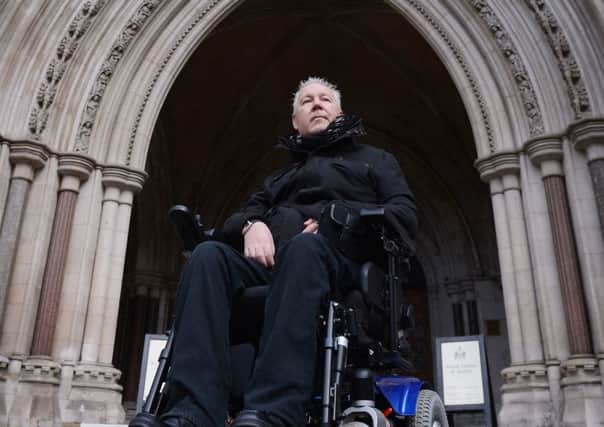Hope remains in the fight for a right to die


Supreme Court justices ruled against Paul Lamb, 58, from Leeds, by a seven-two majority following a hearing in London yesterday.
The 58-year-old, who was left quadriplegic following a crash in 1990, had taken his case to the Supreme Court after losing a Court of Appeal hearing over the issue.
Advertisement
Hide AdAdvertisement
Hide AdHe was in court in London yesterday with Jane Nicklinson, whose late husband Tony began the case. Mr Nicklinson had locked-in syndrome and lost the first round of his battle in the High Court in 2012. Shortly afterwards he began refusing food and died a week later.
At the Supreme Court hearing, nine justices had been asked to decide whether a prohibition on assisted suicide - outlined in the 1961 Suicide Act - was compatible with the right to respect for private and family life enshrined in the European Convention on Human Rights.
Five of the nine justices concluded that the court had the “constitutional authority” to declare that a general prohibition on assisted suicide was incompatible with the human right to private and family life. Two of those five said they would have made such a declaration.
Mr Lamb and Mrs Nicklinson said those conclusions were a “positive” step in the fight for change. Mr Lamb said: “I am very proud of myself. I know it is going to change.”
Advertisement
Hide AdAdvertisement
Hide AdMrs Nicklinson added: “I am disappointed that we lost. But it is a very positive step. Parliament will have to discuss this. I think Tony would be very pleased at how far we have come.”
Their solicitor, Saimo Chahal, added: “Whilst this is not exactly the result we were hoping for, and it does not provide an immediate remedy, it is nonetheless very welcome as we have succeeded in showing that the issue, despite the controversy surrounding it, is one that the courts can adjudicate on and indeed must, if Parliament does not take action soon to consider the plight of people like Paul.
“Jane and Paul can be very proud of the fact that they have made legal history in establishing what the courts should do when fundamental human rights are engaged, no matter how sensitive and difficult the moral and legal arguments are.”
A change in the law on assisted dying is currently being explored through Lord Falconer’s Assisted Dying Bill, which receives its second reading in the House of Lords on July 18.
Advertisement
Hide AdAdvertisement
Hide AdIf passed, the bill would allow terminally ill adults to be given assistance to end their lives.
Commenting in the ruling, Lady Hale, deputy president of the Supreme Court, said some severely disabled people should be allowed help if they want to commit suicide.
She said it would not be beyond the wit of law makers to devise a process which identified the “few” who should be allowed to have assistance.
Lady Hale said the problem was ensuring that “vulnerable” people were not put under “undue pressures” to end their lives. But she said that problem was not sufficient to justify a “universal ban” on assisting suicide.
Advertisement
Hide AdAdvertisement
Hide AdDisability rights campaigner Baroness Tanni Grey-Thompson, who lives in Redcar, had called for the law on assisted suicide to remain unchanged ahead of the Supreme Court ruling.
She said the law offered “very powerful judicial discretion” while preventing people from being coerced into taking their own lives.